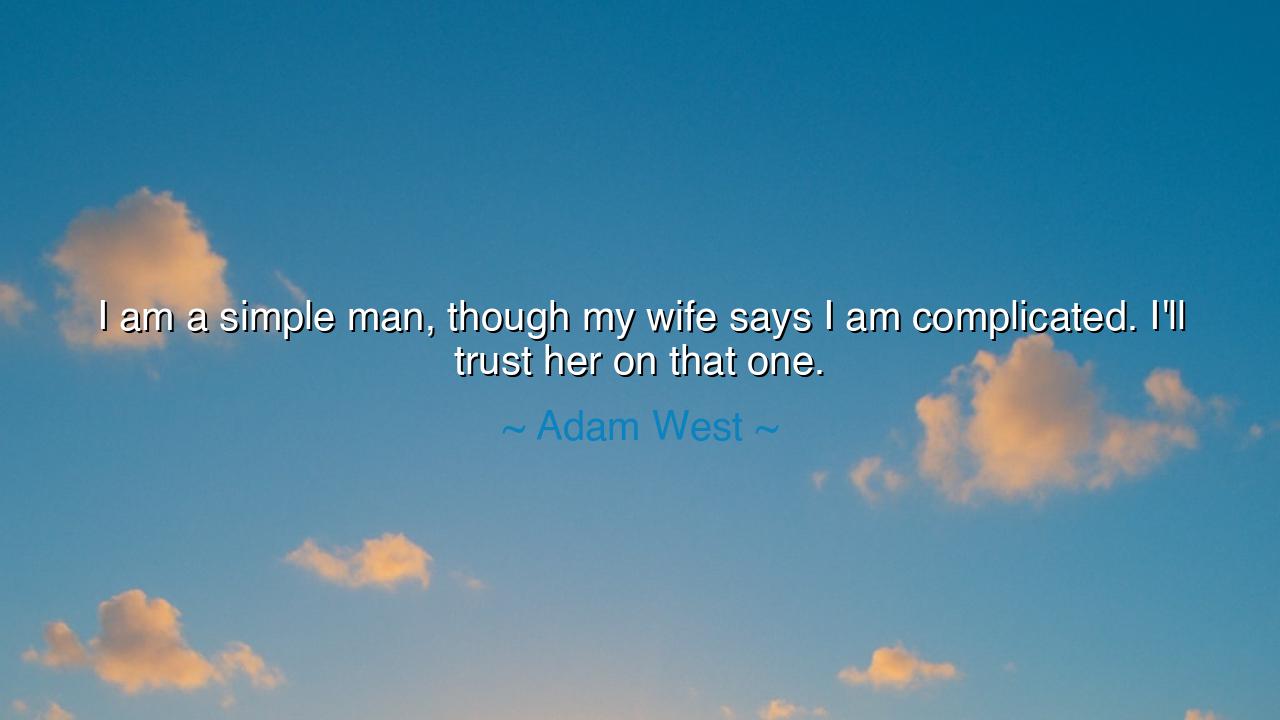
I am a simple man, though my wife says I am complicated. I'll






Hear now the gentle, yet playful words of Adam West: “I am a simple man, though my wife says I am complicated. I’ll trust her on that one.” In this utterance we hear not only the humor of a beloved actor, but also the timeless truth of humility, love, and self-knowledge. The man who once wore the mask of Batman chose, in these words, to remove all masks and show the heart beneath: a man who laughs at himself, honors his companion, and embraces life with simplicity.
To call oneself a simple man is not to confess weakness, but to declare freedom from the pretensions of pride. Simplicity is a virtue of the ancients: to live without deceit, without vanity, to see the world without the fog of endless complication. Yet in his honesty, West bows to the insight of his wife, acknowledging that those who love us often know us better than we know ourselves. Thus, his jest becomes wisdom: we are mysteries even to our own eyes, and we must sometimes trust those who see us daily, those who mirror back the truth we overlook.
History offers many examples of such humility. Consider Marcus Aurelius, the Roman emperor and philosopher. Though ruler of an empire, he called himself a student of virtue, ever reminding himself to be simple, to be honest, to let others correct him. His greatness was not in claiming perfection, but in admitting complexity and relying on wisdom beyond his own. Like West, he knew that the truth of who we are is never only in what we proclaim, but also in what others reveal to us.
There is a deeper teaching in West’s humor. In love and in companionship, we are not solitary beings. We are shaped, challenged, and sometimes defined by those closest to us. To say, “I’ll trust her on that one,” is to confess a sacred truth: that trust in a partner is the anchor of belonging. In this, West teaches that wisdom is not always found in self-certainty, but often in the humility to yield to the insight of another. Such yielding is not weakness—it is strength born of love.
And yet, there is beauty in the paradox: that one may strive for simplicity, yet remain complicated. The human soul is vast; we are both childlike and mysterious, both plain and intricate. West’s words embrace this duality with humor rather than despair. To live with joy is to accept that we are not always as straightforward as we wish, yet we need not be burdened by it. In this balance of laughter and honesty lies a path of peace.
The lesson is clear: seek simplicity in your life, but do not deny your complexity. Be humble enough to laugh at yourself, to let others teach you who you are, to trust those who see you truly. Do not strive to appear flawless, for such striving is a prison. Instead, embrace authenticity, even when it shows your contradictions. In that authenticity, you will find freedom, love, and belonging.
Practically, let your life be lived in openness. Share your thoughts with those you love, even your confusions. Invite their perspective, and honor it, as Adam West honored his wife’s words. Practice the art of laughter at your own expense, for laughter dissolves the pride that divides hearts. And when you are torn between your simplicity and your complexity, choose honesty, choose humility, choose trust—for these will lead you closer to peace.
So remember, O children of tomorrow: to be simple is noble, to be complicated is human, and to trust those who love you is the greatest wisdom of all. Walk in humility, rejoice in your contradictions, and let laughter and love guide your days. For in the end, the man who can call himself simple, admit his complications, and still bow to love has mastered the highest art of living.






QMVo Quang Minh
This quote is funny, but it also says something about humility and self-awareness. Adam West seems to admit that, despite thinking of himself as simple, others might see more layers to him than he does. I’m curious—does his wife’s perspective on his complexity come from a deeper understanding of his personality, or is it just an affectionate way to tease him? I think it’s fascinating how someone close to us can reveal hidden parts of ourselves we might not be aware of.
TDThanh Duy
I find this quote amusing but also thought-provoking. It highlights how relationships often reveal sides of us we don’t see ourselves. Can someone ever really know themselves completely? I think Adam West’s humor shows that we all have a mix of simplicity and complexity, but it’s how others perceive us that often defines our true nature. Is it possible that his wife sees him in ways that he might overlook in himself?
Y매Oreki Yunamey 매수민
This quote feels so relatable. How many of us see ourselves as simple, only for someone we love to see us as more complicated? I like how Adam West takes a lighthearted approach to something many might take seriously. It’s interesting that he leaves the judgment to his wife—does that mean that our loved ones know us better than we know ourselves? Or is it just a playful acknowledgment of how we can all be a little complex at times?
TDStupid-Wolf thuong dang
I love the humor in this quote. It’s such a playful take on self-perception vs. how others see you. It makes me wonder, though, how often do we think we understand ourselves, only to have someone close point out something entirely different? It’s almost as if Adam West is acknowledging that we can’t always be objective about ourselves. Does this mean we should rely more on those who know us best for insights into our own complexities?